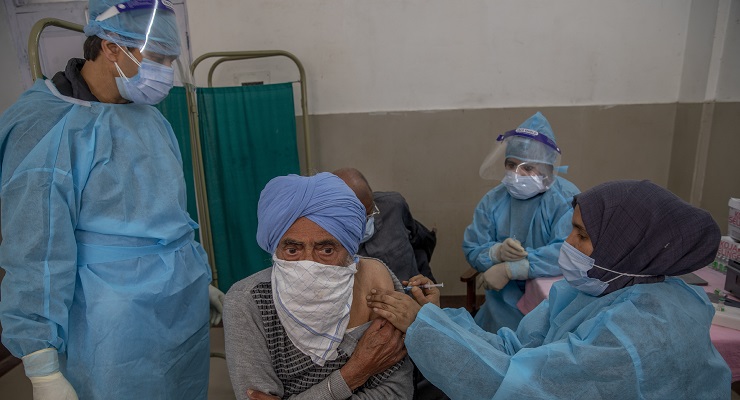
Australia is stonewalling a proposal to temporarily waive the intellectual property rights of COVID-19 vaccines and treatments, affecting how many doses can be manufactured.
Global COVID-19 cases have reached record highs in recent weeks with millions of new daily cases. India, in particular, is struggling, with hospitals turning away patients amid shortages of hospital beds and medical equipment. Australia has banned all flights from India until at least May 15 in response to the climbing numbers, leaving 9000 Aussies stranded in a virus-ravaged country.
Members of the World Trade Organization (WTO) will meet virtually on Friday to discuss the proposal. The waiver is supported by many developing nations, including India and South Africa — though it’s being blocked by the US, EU, UK, Switzerland, Japan, Norway, Canada, Australia and Brazil.
What could the waiver do?
The waiver would allow countries to produce generic versions of the vaccine and COVID-19 treatments at a much cheaper price.
Director of the Southgate Institute of Health, Society and Equity at Flinders University Fran Baum told Crikey she estimated global vaccination rates could be achieved in half the current expected time frame, by the end of 2022 instead of the end of 2024.
“There’s a really strong moral case, and then there’s a strong public health case because if we don’t control COVID all around the world, it’s going to be very hard for Australia to ever open up or for Australians to travel overseas,” Baum said.
The waiver is especially important given that two doses of the vaccine will likely not be enough. Booster doses are likely to be necessary, along with annual shots to keep up with mutations of the virus.
Would the waiver be effective?
Critics of the waiver, including billionaire philanthropist Bill Gates, have said it isn’t likely to do anything given most vaccine manufacturers are already at capacity.
India’s biggest vaccine maker, the Serum Institute of India, is facing shortages of raw materials needed to manufacture the AstraZeneca and Covovax vaccines. It’s also asked for funding from the Indian government to ramp up production as it failed to meet production targets. The institute planned to produce 100 million doses a month by March but has pushed this goal back to June.
Secondary concerns are that when manufacturers reverse-engineer the vaccine — something they may not be able to do — they could tweak the vaccine recipe, affecting its quality.
But the co-vice chair of the Commission for the Human Future Sharon Friel told Crikey this isn’t a concern supported by evidence. During the HIV/AIDS epidemic, the WTO created the Doha Ministerial Declaration to allow poorer countries, which didn’t have the capacity to make pharmaceutical products, to import cheaper generic drugs from countries with a patent.
“It was good, it saved vast numbers of people in South Africa and elsewhere around the world,” Friel said.
“There is no evidence to suggest that the generics are less safe or effective.”
Why is Australia stonewalling it?
Australia has no skin in the vaccine game — The University of Queensland COVID-19 vaccine was abandoned after producing false-positive readings of the AIDS virus. So why are we stonewalling a proposal that will help the world open back up?
Friel said it was down to geopolitics. “It’s about being seen to support their friends and allies,” she said.
“It’s not really about whether they do or don’t have a vaccine. It’s about who they’re seeing to support in this and what that will mean for the future.”
Baum said the Australian government was likely listening to big pharma.
“Pharmaceutical companies form very powerful lobbying groups. They have much better access to decision-makers than academics,” she said, but added that it didn’t make sense.
“There are three bottom lines. There’s the moral bottom line, the public health bottom line and the economic bottom line — [the waiver] makes economic sense as people can more easily start going about all the things they do that are important to economies in different ways around the world.”
The Public Health Association of Australia and Médecins Sans Frontières are collecting signatures for an open letter to Prime Minister Scott Morrison to support the waiver, to be presented on Friday.
Minister for Trade Dan Tehan, Minister for Foreign Affairs Marise Payne, and the Department of Foreign Affairs and Trade did not respond to Crikey’s request for comment.








why is Australia blocking generic vaccines? – because the people with all the money want us too
“Minister for Trade Dan Tehan, Minister for Foreign Affairs Marise Payne, and the Department of Foreign Affairs and Trade did not respond to Crikey’s request for commen” t- nor will they the gutless unethical turds.
If the world can’t come together for this then there is zero chance of it ever coming together for mutual benefits like trade, defence, or even seeking peace.
The drums of war are beating according to one of the nations most toxic public servants….what hope does humanity have when even during a pandemic affecting all humanity, ghouls still call for war?
… and that climate thingy, supposed to be a big deal or something.
The bottom line is Big Pharma, and a government ideologically welded to being “Big Business Friendly”.
Australia once again on the wrong side of the argument. When the EU argues for stronger climate action Australia opposes. (How come we don’t worry about the geopolitics and who we’re seen as supporting there?) When the EU, in a real d*** move, opposes the waving of intellectual property rights of Covid vaccines – Australia supports the EU.
Once again the Western countries show how selfish and greedy they are. How lacking in any moral authority.